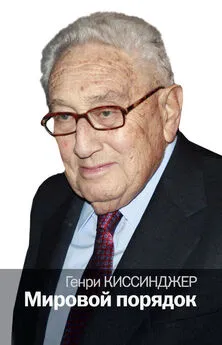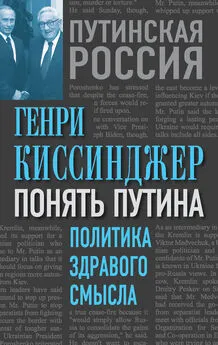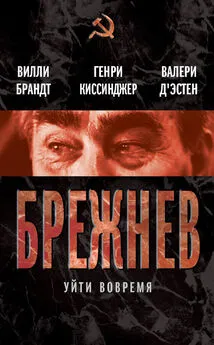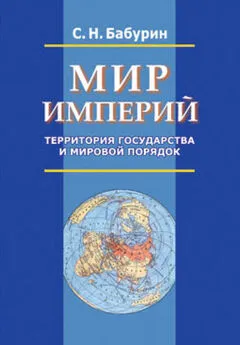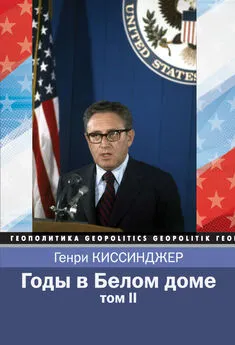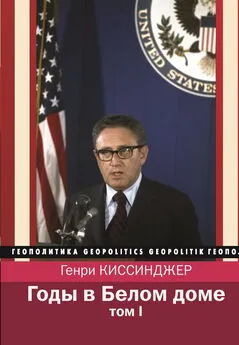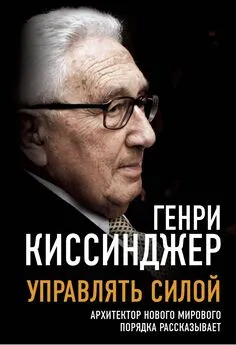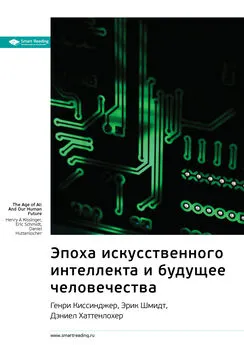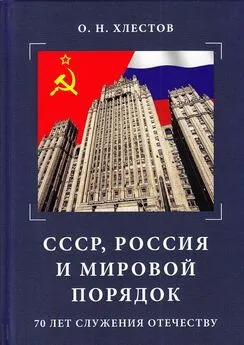Генри Киссинджер - Мировой порядок
- Название:Мировой порядок
- Автор:
- Жанр:
- Издательство:Array Литагент «АСТ»
- Год:2015
- Город:Москва
- ISBN:978-5-17-087154-4
- Рейтинг:
- Избранное:Добавить в избранное
-
Отзывы:
-
Ваша оценка:
Генри Киссинджер - Мировой порядок краткое содержание
Мировой порядок - читать онлайн бесплатно ознакомительный отрывок
Интервал:
Закладка:
Publius [Alexander Hamilton], The Federalist 1, in Alexander Hamilton, James Madison, and John Jay, The Federalist Papers (New York: Mentor, 1961), 1–2.
John O’Sullivan, «Annexation», United States Magazine and Democratic Review, July – August 1845, 5.
John Quincy Adams, «An Address Delivered at the Request of the Committee of Citizens of Washington, 4 July 1821» (Washington, D.C.: Davis and Force, 1821), 28–29.
Jedidiah Morse, The American Geography; or, A View of the Present Situation of the United States of America, 2nd ed. (London: John Stockdale, 1792), 468–469, as excerpted in Manifest Destiny and American Territorial Expansion: A Brief History with Documents, ed. Amy S. Greenberg (Boston: Bedford/St.Martin’s, 2012), 53.
John O’Sullivan, «The Great Nation of Futurity», United States Magazine and Democratic Review, November 1839, 426–427.
Amanda Foreman, A World on Fire: Britain’s Crucial Role in the American Civil War (New York: Random House, 2011);
Howard Jones, Blue and Gray Diplomacy: A History of Union and Confederate Foreign Relations (Chapel Hill: University of North Carolina Press, 2009).
Fareed Zakaria, From Wealth to Power: The Unusual Origins of America’s World Role (Princeton, N.J.: Princeton University Press, 1998), 47.
Grover Cleveland, First Inaugural Address, March 4, 1885, in The Public Papers of Grover Cleveland (Washington, D.C.: Government Printing Office, 1889), 8.
Thomas G. Paterson, J. Garry Clifford, and Kenneth J. Hagan, American Foreign Policy: A History (Lexington, Mass.: D. C. Heath, 1977), 189.
Theodore Roosevelt, Inaugural Address, March 4, 1905, in United States Congressional Serial Set 484 (Washington, D.C.: Government Printing Office, 1905), 559.
Theodore Roosevelt, «International Peace», Nobel lecture, May 5, 1910, in Peace: 1901–1925: Nobel Lectures (Singapore: World Scientific Publishing Co., 1999), 106.
Roosevelt’s statement to Congress, 1902, quoted in John Morton Blum, The Republican Roosevelt (Cambridge, Mass.: Harvard University Press, 1967), 137.
Roosevelt to Spring Rice, December 21, 1907, in The Selected Letters of Theodore Roosevelt, ed. H. W. Brands (Lanham, Md.: Rowman & Littlefield, 2001), 465.
Theodore Roosevelt, review of The Influence of Sea Power upon History, by Alfred Thayer Mahan, Atlantic Monthly, October 1890.
Theodore Roosevelt, «The Strenuous Life», in The Strenuous Life: Essays and Addresses (New York: Century, 1905), 9.
Edmund Morris, Theodore Rex (New York: Random House, 2001), 176–82.
Theodore Roosevelt’s Annual Message to Congress for 1904, HR 58A-K2, Records of the U.S. House of Representatives, RG 233, Center for Legislative Archives, National Archives.
James R. Holmes, Theodore Roosevelt and World Order: Police Power in International Relations (Washington, D.C.: Potomac Books, 2007), 10–13, 68–74.
Woodrow Wilson, Commencement Address at the U.S. Military Academy at West Point (June 13, 1916), in Papers of Woodrow Wilson, ed. Arthur S. Link (Princeton, N.J.: Princeton University Press, 1982), 37:212.
Woodrow Wilson, Address to a Joint Session of Congress on the Conditions of Peace (January 8, 1918) («Fourteen Points»), as quoted in A. Scott Berg, Wilson (New York: G. P. Putnam’s Sons, 2013), 471.
Treaties for the Advancement of Peace Between the United States and Other Powers Negotiated by the Honorable William J. Bryan, Secretary of State of the United States, with an Introduction by James Brown Scott (New York: Oxford University Press, 1920).
Woodrow Wilson, Message to Congress, April 2, 1917, in U.S. Presidents and Foreign Policy from 1789 to the Present, ed. Carl C. Hodge and Cathal J. Nolan (Santa Barbara, Calif.: ABC–CLIO, 2007), 396.
«Peace Without Victory», January 22, 1917, in supplement to American Journal of International Law 11 (1917): 323.
Wilson, Message to Congress, April 2, 1917, in President Wilson’s Great Speeches, and Other History Making Documents (Chicago: Stanton and Van Vliet, 1917), 17–18.
Woodrow Wilson, Fifth Annual Message, December 4, 1917, in United States Congressional Serial Set 7443 (Washington, D.C.: Government Printing Office, 1917), 41.
Wilson, Fifth Annual Message, December 4, 1917, in The Foreign Policy of President Woodrow Wilson: Messages, Addresses and Papers , ed. James Brown Scott (New York: Oxford University Press, 1918), 306.
Lloyd George, Wilson memorandum, March 25, 1919, in Ray Stannard Baker, ed., Woodrow Wilson and World Settlement (New York: Doubleday, Page, 1922), 2:450.
Harold Nicolson, Peacemaking, 1919 (1933; London: Faber & Faber, 2009).
Margaret MacMillan, Paris 1919: Six Months That Changed the World (New York: Random House, 2002).
«Differences Between the North Atlantic Treaty and Traditional Military Alliances», appendix to the testimony of Ambassador Warren Austin, April 28, 1949, in U.S. Senate, Committee on Foreign Relations, The North Atlantic Treaty , hearings, 81st Cong., 1st sess. (Washington, D.C.: Government Printing Office, 1949), pt. I.
Roosevelt to James Bryce, November 19, 1918, in The Letters of Theodore Roosevelt, ed. Elting E. Morrison (Cambridge, Mass.: Harvard University Press, 1954), 8:1400.
See Peter Clarke, The Last Thousand Days of the British Empire: Churchill, Roosevelt, and the Birth of the Pax Americana (New York: Bloomsbury Press, 2009).
Radio Address at Dinner of Foreign Policy Association, New York, October 21, 1944, in Presidential Profiles: The FDR Years, ed. William D. Peterson (New York: Facts on File, 2006), 429.
Fourth Inaugural Address, January 20, 1945, in My Fellow Americans: Presidential Inaugural Addresses from George Washington to Barack Obama (St. Petersburg, Fla.: Red and Black Publishers, 2009).
William C. Bullitt, «How We Won the War and Lost the Peace», Life, August 30, 1948, as quoted in Arnold Beichman, «Roosevelt’s Failure at Yalta», Humanitas 16, no. 1 (2003): 104.
Keith Eubank, Summit at Teheran: The Untold Story (New York: William Morrow, 1985), 188–196.
T. A. Taracouzio, War and Peace in Soviet Diplomacy (New York: Macmillan, 1940), 139–140.
Charles Bohlen, Witness to History, 1929–1969 (New York: W. W. Norton, 1973), 211.
Conrad Black, Franklin Delano Roosevelt: Champion of Freedom (New York: PublicAffairs, 2003).
Harry S. Truman, Address on Foreign Policy at the Navy Day Celebration in New York City, October 27, 1945.
Dwight D. Eisenhower, Second Inaugural Address («The Price of Peace»), January 21, 1957, in Public Papers of the Presidents: Dwight D. Eisenhower, 1957–1961, 62–63.
Gerald Ford, Address to a Joint Session of Congress, August 12, 1974, in Public Papers of the Presidents: Gerald R. Ford (1974–1977), 6.
Lyndon B. Johnson, Address to the United Nations General Assembly, December 17, 1963.
Robert Kagan, The World America Made (New York: Alfred A. Knopf, 2012).
Milovan Djilas, Conversations with Stalin, trans. Michael B. Petrovich (New York: Harcourt Brace & Company, 1962), 114.
Kennan to Charles Bohlen, January 26, 1945, as quoted in John Lewis Gaddis, George Kennan: An American Life (New York: Penguin Books, 2011), 188.
«X» [George F. Kennan], «The Sources of Soviet Conduct», Foreign Affairs 25, no. 4 (July 1947).
Robert Rhodes James, ed., Winston S. Churchill: His Complete Speeches, 1897–1963 (New York: Chelsea House, 1974), 7:710.
A Report to the National Security Council by the Executive Secretary on United States Objectives and Programs for National Security, NSC-68 (April 14, 1950), 7.
John Foster Dulles, «Foundations of Peace» (address to the Veterans of Foreign Wars, New York, August 18, 1958).
Shen Zhihua, Mao, Stalin, and the Korean War: Trilateral Communist Relations in the 1950s, trans. Neil Silver (London: Routledge, 2012), 140.
Chen Jian, China’s Road to the Korean War: The Making of the Sino-American Confrontation (New York: Columbia University Press, 1994), 149–150.
Sergei N. Goncharov, John W. Lewis, and Xue Litai, Uncertain Partners: Stalin, Mao, and the Korean War (Stanford, Calif.: Stanford University Press, 1993).
Henry Kissinger, On China (New York: Penguin Press, 2011).
Shen, Mao, Stalin, and the Korean War; and Shu Guang Zhang, Mao’s Military Romanticism: China and the Korean War, 1950–1953 (Lawrence: University Press of Kansas, 1995).
General Omar N. Bradley, Chairman of the Joint Chiefs of Staff, testimony before the Senate Committees on Armed Services and Foreign Relations, May 15, 1951, in Military Situation in the Far East , hearings, 82nd Cong., 1st sess., pt. 2, 732 (1951).
Peter Braestrup, Big Story: How the American Press and Television Reported and Interpreted the Crisis of Tet 1968 in Vietnam and Washington (Boulder, Colo.: Westview Press, 1977).
Robert Elegant, «How to Lose a War: The Press and Viet Nam», Encounter (London), August 1981, 73–90.
Guenter Lewy, America in Vietnam (New York: Oxford University Press, 1978), 272–279, 311–324.
«An Interview with the President: The Jury Is Out», Time, January 3, 1972.
Richard Nixon, U.S. Foreign Policy for the 1970’s: Building for Peace: A Report to the Congress, by Richard Nixon, President of the United States, February 25, 1971, 107.
Richard Nixon, Remarks to Midwestern News Media Executives Attending a Briefing on Domestic Policy in Kansas City, Missouri, July 6, 1971, in Public Papers of the Presidents, 805–806.
Richard Nixon, Second Inaugural Address, January 20, 1973, in My Fellow Americans, 333.
Richard Nixon, U.S. Foreign Policy for the 1970’s: Building for Peace, 10.
Richard Nixon, U.S. Foreign Policy for the 1970’s: A New Strategy for Peace, February 18, 1970, 9.
Richard Nixon, U.S. Foreign Policy for the 1970’s: Shaping a Durable Peace, May 3, 1973, 232–33.
Ronald Reagan, Farewell Address to the American People, January 11, 1989, in In the Words of Ronald Reagan: The Wit, Wisdom, and Eternal Optimism of America’s 40th President , ed. Michael Reagan (Nashville: Thomas Nelson, 2004), 34.
Ronald Reagan, An American Life (New York: Simon & Schuster, 1990), 592.
Lou Cannon, President Reagan: The Role of a Lifetime (New York: Simon & Schuster, 1990), 792.
Ronald Reagan, Address Before a Joint Session of Congress on the State of the Union, January 25, 1984, in The Public Papers of President Ronald W. Reagan, Ronald Reagan Presidential Library.
George H. W. Bush, Remarks to the Federal Assembly in Prague, Czechoslovakia, November 17, 1990, accessed online at Gerhard Peters and John T. Woolley, eds., The American Presidency Project .
George H. W. Bush, Remarks at Maxwell Air Force Base War College, Montgomery, Alabama, April 13, 1991, in Michael D. Gambone, Small Wars: Low-Intensity Threats and the American Response Since Vietnam (Knoxville: University of Tennessee Press, 2012), 121.
«Confronting the Challenges of a Broader World», President Clinton Address to the UN General Assembly, New York City, September 27, 1993, in Department of State Dispatch 4, no. 39 (September 27, 1993).
Читать дальшеИнтервал:
Закладка:
